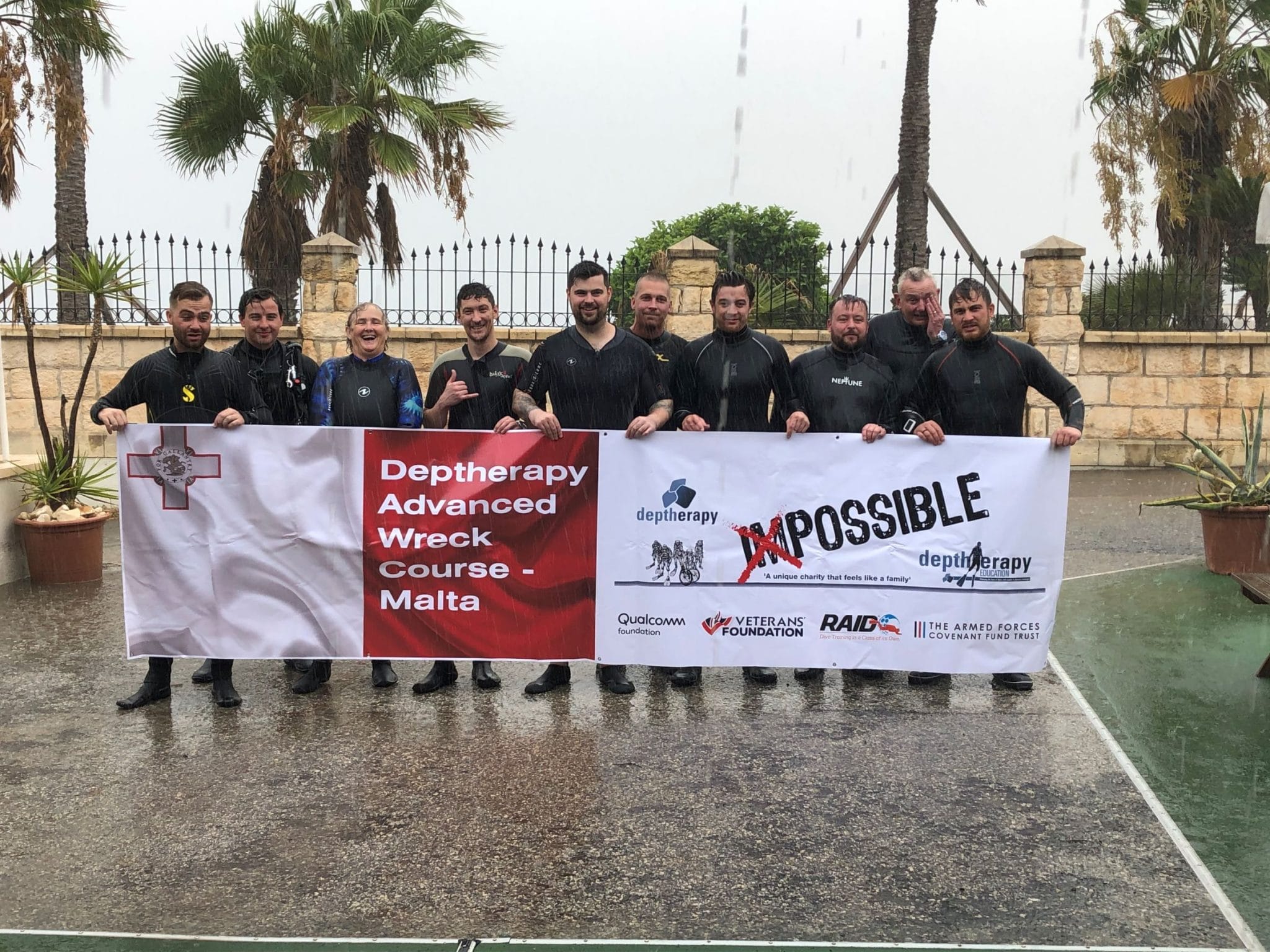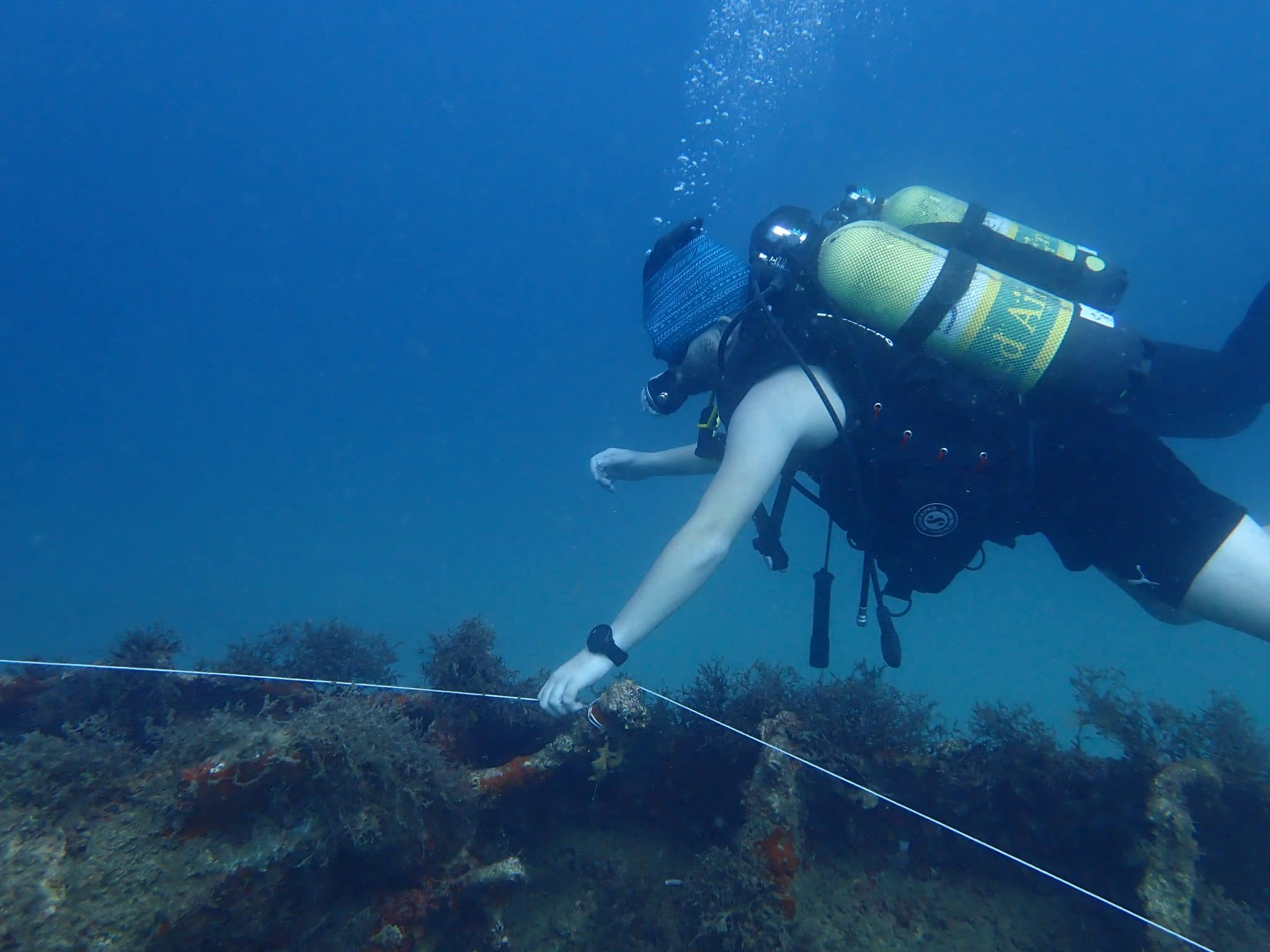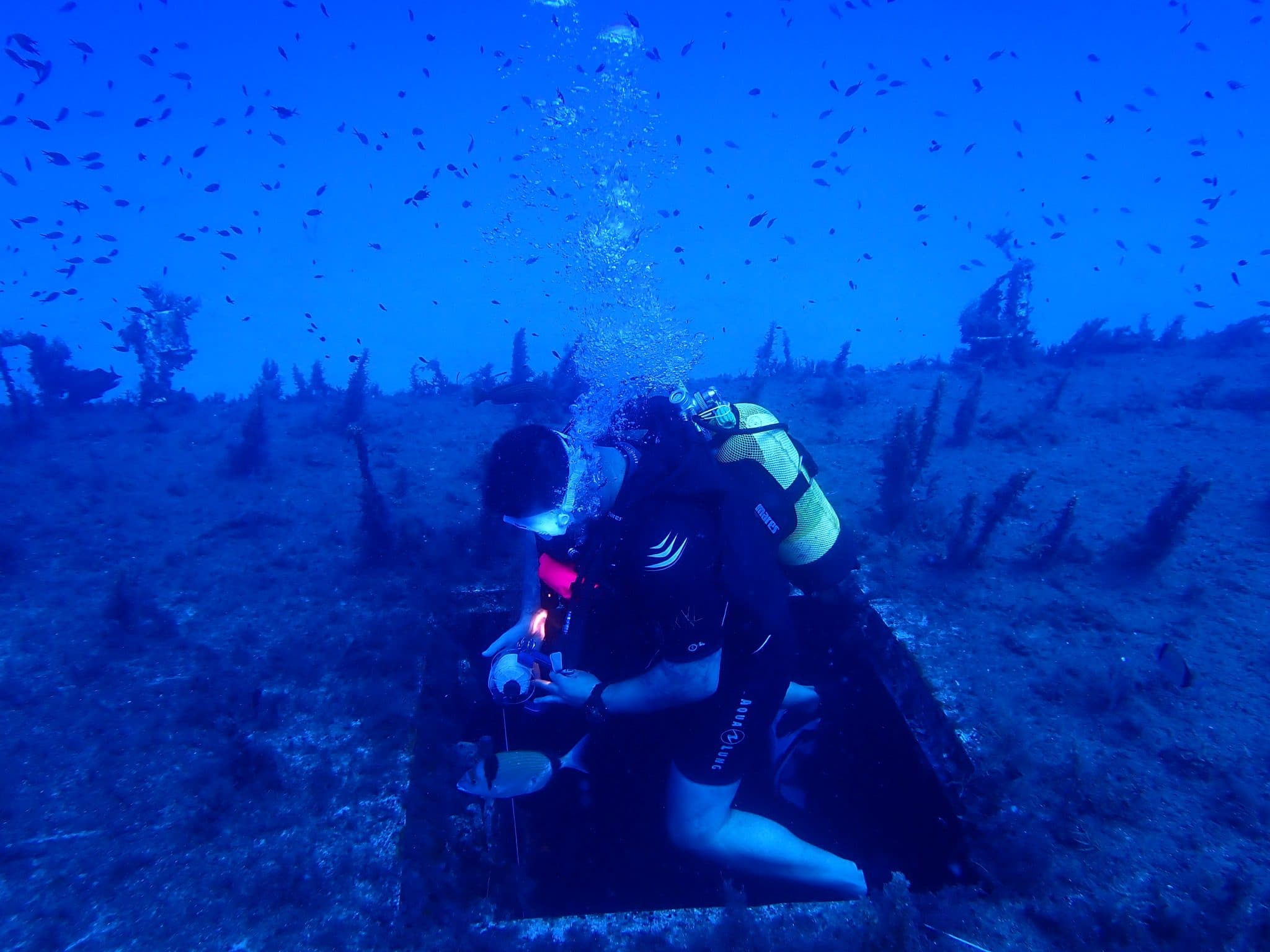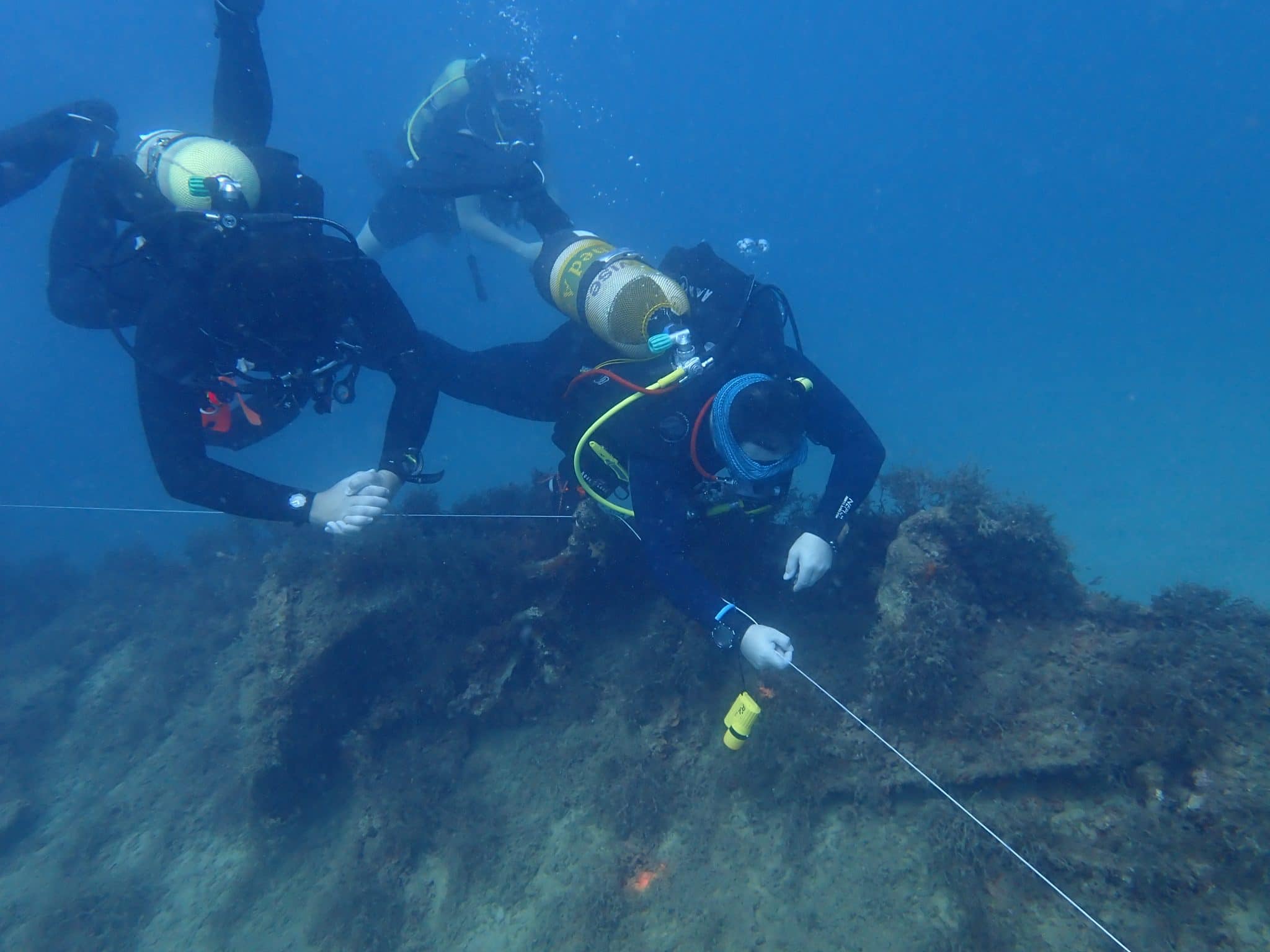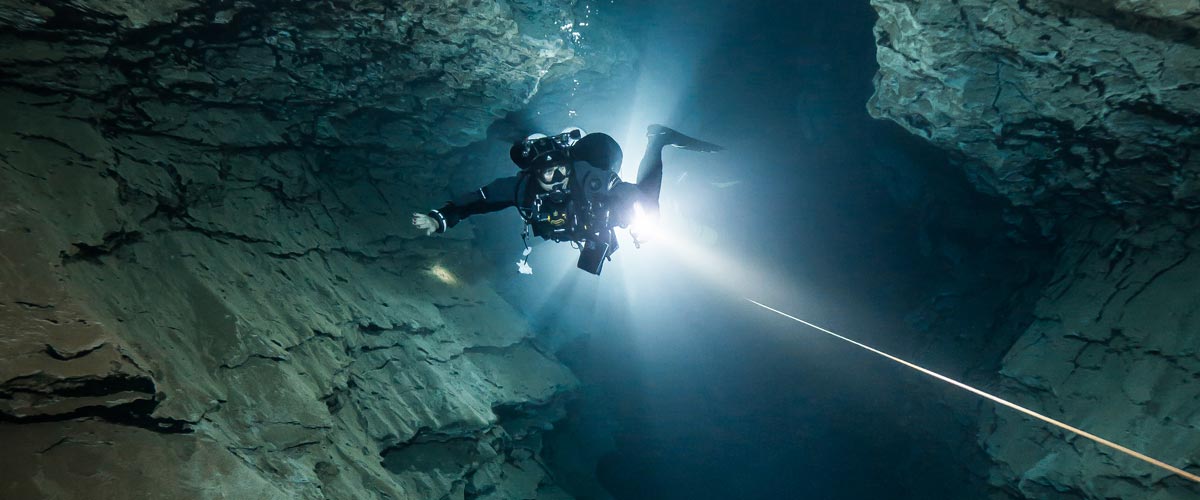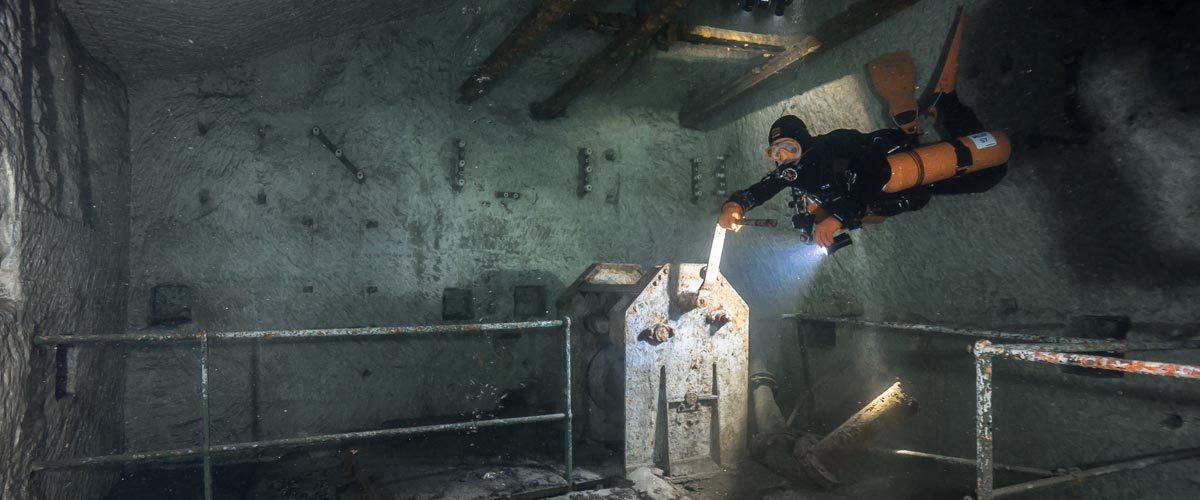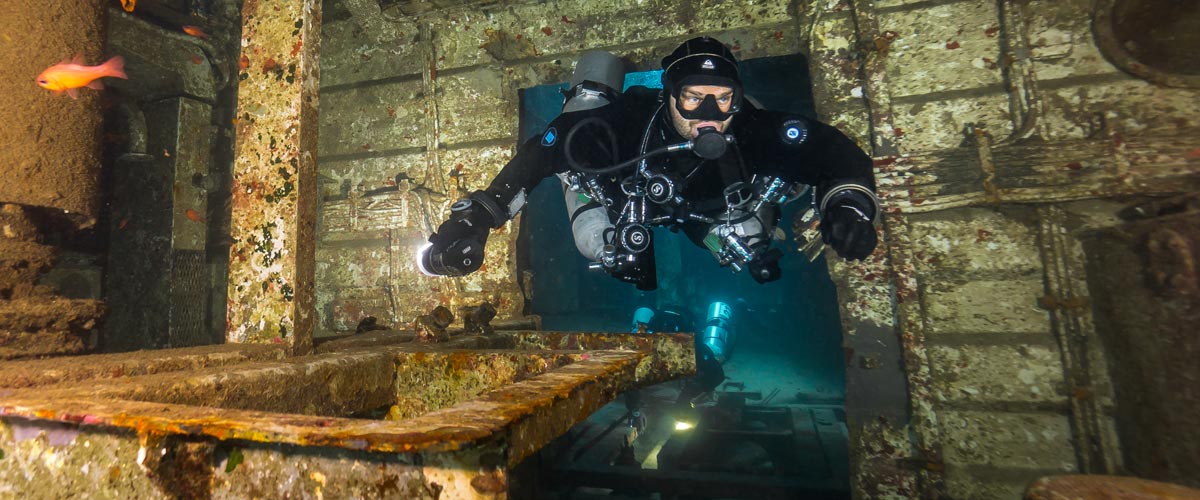Dive Training Blogs
Blog: Deptherapy go wreck diving in Malta
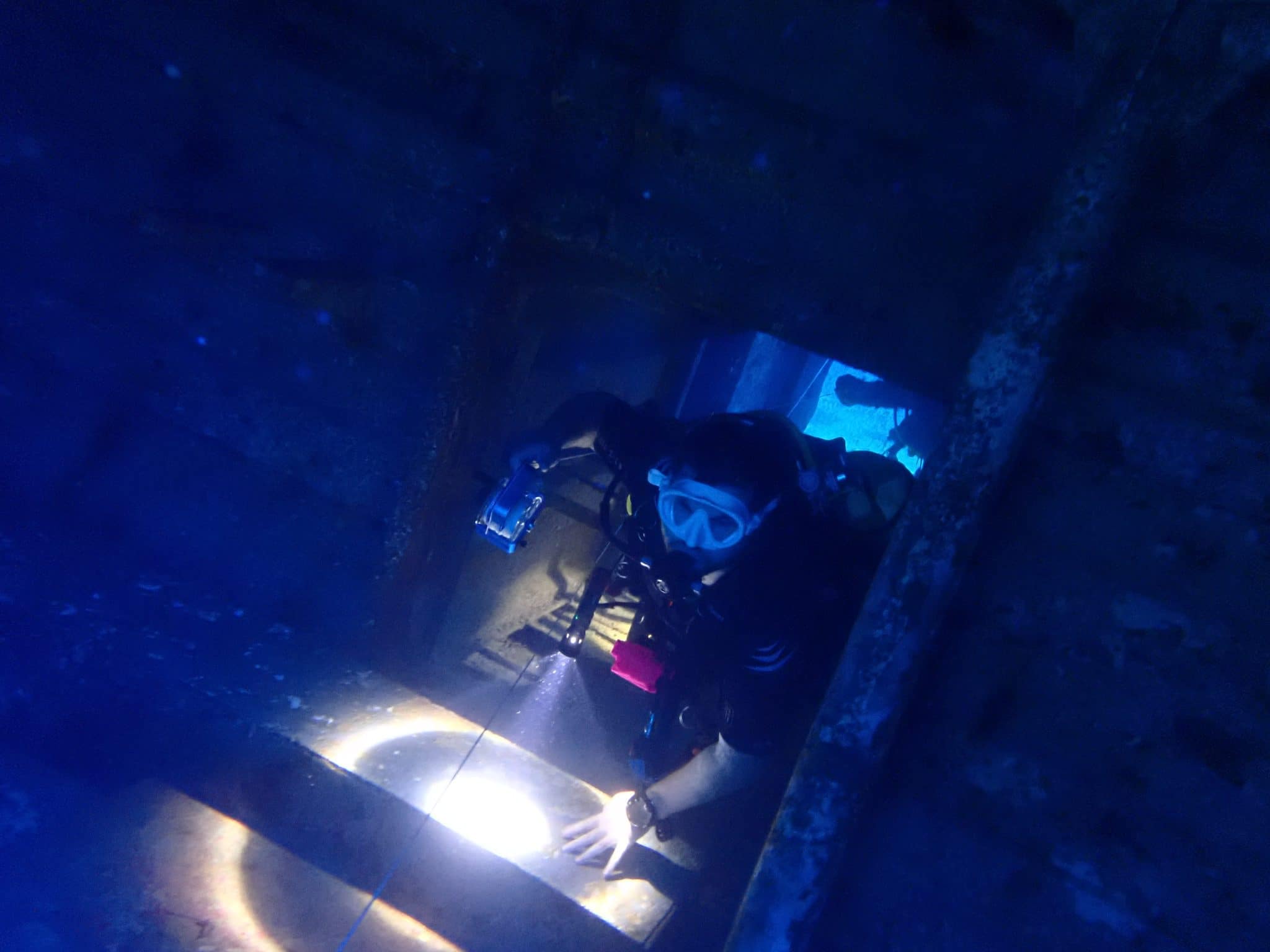
A Guest Blog from Deptherapy and Deptherapy Education Instructor Sharon El Shoura about the charity’s recent expedition to Malta…
Day one – Friday 3 September
Firstly just to explain what we do ….
We are a completely volunteer-led charity that seeks to rehabilitate injured troops, who have suffered life changing injuries, through the medium of scuba diving.
Our plan was to take eight beneficiaries to Malta to complete their RAID Advanced Wreck course.
So an early start for some to get to Heathrow for our previously agreed meeting time, with some of the beneficiaries travelling from various parts of the country starting out at 0100.
Thankfully we all made it in time, well most of us! You know who you are!!
So Heathrow was very quiet and the transition through security was easy unless your name is Sean Martin, who had all the contents of his rucksack emptied and swabbed, including the inside of the dive log, obviously he is a bit dodgy looking 😉
So we loaded onto the very busy Air Malta flight, unable to book seats in advance we found ourselves scattered around the plane, service was very limited.
Arrival at Malta International Airport was a mixed experience for some. With the new requirements for COVID, our EU Passenger Locator forms were checked with the necessary COVID vaccination paperwork and we were sent through to a special screening area where it seemed that Sean’s look was still obviously a bit dodgy as he was taken into a separate room which ended being a case of mistaken identity!
So finally through to the warm, sticky atmosphere outside where we were met by drivers from the Dive Centre, Divewise and Tom Swarbrick who was already on the island. We loaded up the equipment and the rest of us piled into the air-conditioned bus and off to the dive centre. About 20 minutes later we arrived at the dive centre in St Julian’s to a very warm welcome from Alan and Viv, who gave us a guided tour of the facilities, including the shore entry to the sea, just to wet our appetites for the morning dives! Then it was onto the paperwork and sorting out of kit, and then the bags returned to the truck and some chose to walk to our accommodation at Behotel, whilst others opted for the air conditioned bus again.
Check in was somewhat complicated due to a misunderstanding of the booking, but finally rooms allocated, we arranged to meet in the nearest hostelry to sample the night life.
Day two – Saturday 4 September
So after a very good night’s sleep and an excellent breakfast at the hotel, we headed for the dive centre, which was about a 15 minute walk away. On arrival we decided to do some line tying skills and some academic refreshers whilst the other guests at the hotel got off to their days diving.
THEN………….
Thunderstorms and rain with drops the size of golf balls descended on us, sent us running for cover with little success. It was like we had all been in for our first dive without actually getting in the water!
Not to be deterred it seemed like a perfect moment to take a group picture!
As the rain’s slowed and the thunder and lightening stopped we took the opportunity to get into the water at the shore, to check weights and equipment, with plans to practice using the blacked out masks and tying skills in the water. Unfortunately the storm had stirred up the water so much it was like diving in a blacked out mask permanently; the visibility was very poor and the surge was pretty uncomfortable, but certainly had everyone using their navigation skills. Everyone ended up back on the shore safe and richer for the experience, although sea sickness did hit a few because of the surge.
Day three – 5 September
So a slightly later start to the day allowed the dive centre to clear its other guests to various locations and then we were onto the buses and trucks with resident instructor/ trainer Joe Phillips to go dive in the Bay of St Elmo, which lies on the south side of the entrance to Marsamxett Harbour. From the bay the bastion walls are an impressive site, and also the location of some films: World War Z, Assassins Creed and American Assassin to name a few!
The bay is also popular with divers due to HMS Maori, which was a destroyer in the British fleet that was sunk in WW2. HMS Maori lies in 14 metres of water approximately 250 metres from the shore, so our plan was to enter from the shore and descend, do our safety checks in the water and swim across to the wreck, and use the wreck to start expanding the skills of primary and secondary tie offs on the outside of the wreck, and following the line, adding wraps on the line, which show the direction of travel into or out of a wreck. Then, we planned to follow the lines with blacked out masks.
So we split into two groups of four students and each buddy pair were tying off on two places outside of the wreck, then following the line and following with masks covered up. We also practiced deploying SMBs mid water. Whilst in the water it is essential that the teams understand the air consumption at different depths so we all performed a 10 minute swim at an agreed depth of 10 metres, recording the air used during the exercise so the divers could work out their individual Surface Air Consumption also known as their SAC rates.
Once we had completed these drills it was time to head back to the shore and change the tanks and spend time on the surface before going back in for Dive 2.
During Dive 2 the teams were then simulating their lost line drills and entanglement drills. The teams worked extremely well together, and when you consider that the majority of the teams have suffered from mental health issues due to their service, they all performed the skills with professionalism and no panic attacks. It was wonderful to watch them successfully complete the skills.
So diving done, back to the dive centre, wash out the kit and store away and back to our hotel to again get ready to sample the night life of St Julian’s.
Day four – 6 September
Overnight, there had been very unusual weather and Malta had experienced winds that had a negative impact on the diving, limiting the locations and of course we have to risk assess all of the entry and exits because of the injuries that some of the beneficiaries are carrying.
So although today was planned to go out on the boat, this just was not possible because of the winds and sea conditions, so after discussions and suggestions being made we headed out to Marsaskala to try and dive the P33 which was a former patrol boat that was scuttled at the end of July 2021, close to already existing tug boat wrecks.
This wreck was built in Germany in 1971/2 and is around 23 metres long and has a beam of 5 metres. It sits in approximately 20 metres of water making it a great wreck for training on. Unfortunately on arriving at the site, it became obvious that due to the entry and exit being at the bottom of a long walk down to stone steps that were being bashed with quite strong waves it was not safe to dive. As always we have to consider the safety of all the beneficiaries. Again after consultation with resident Instructor Joe, and Viv back at the dive centre, we headed off to the X127 wreck located in the harbour at Marsamxett. The X127 was built in 1915 and sunk in 1942; she lies upright on a slope with her bow at 5 metres, and the stern at 22 metres. The access to this wreck was a lot easier and the bay itself was sheltered from the winds, so diving went ahead. As the wreck was not possible to penetrate safely due to the large numbers of divers and the high level of silt, it was dived by the beneficiaries as a recreational dive, but of course never one to let an opportunity pass, we did extra drills experimenting with weights and more exercises with the SMBs.
Due to the poor weather, we decided to do two dives on the wreck and then we headed back to the dive centre to wash down and pack away the kit.
Day five – 7 September
Unfortunately this day was completely ruined by the expected thunderstorms and predicted high winds, so diving was cancelled and most of us took to the pool area and spent the day relaxing.
Day six – 8 September
So today brought about slightly better weather, although still not able to dive on a boat, it was thought that maybe we could return to the P33 at Marsaskalla, but when we arrived the conditions were worse than when we first visited and again with the welfare of the group in mind, it was decided to move to a different location! So having Alan Whitehead owner of Divewise with us, off to Cirkewwa we went!
Cirkewwa is very popular with divers and has a couple of wrecks, swimthroughs and a patch of reef to explore. Unfortunately due to the weather, many other dive centres had the same idea, and also as it was a public holiday in Malta, the queue to the ferry terminal which takes day trippers to Gozo was very, very long! Once we arrived at the dive site, we carried out a risk assessment and decided it would be possible to dive the first wreck which was laying at 34 metres. So continuing with the RAID Advanced Wreck course, we would be tying primary and secondary lines within the wreck and the students would be following in, and then simulating out of air scenarios and swimming out on long hoses, finding guidelines and following out of the wreck to the primary tie-offs.
Off we went out to the wreck P29 which appeared out of the gloom, and was actually very well preserved. She was a 52 metre patrol boat that was scuttled in 2007 and sits at 34 metres at the deepest point and approximately 12 metres at the highest point. Covered in life, the P29 was a perfect wreck for the skills.
So after returning back to the shore, tanks changed and a good surface interval, the students were given the opportunity to explore the reef system themselves as qualified divers. So off they went and came back with different stories of their findings; two of them actually found the second wreck – the Rozi – further along the reef, and with some pretty impressive video to prove its existence. The Rozi was a former tugboat of approximately 30 metres in length, laying upright with the bottom around 30 metres and the top around 20 metres.
All in all, despite the issues with the weather and the lack of boat diving, everyone was close to finishing their courses and had enjoyed their diving.
Day seven – 9 September
So our day started with the required visit to a COVID testing centre prior to our departure from Malta back to the UK. So off to the centre, everyone swabbed and then back to the dive centre. Due to our later flight time on Friday, it was possible to get in a couple of dives. So it was organised that in our groups we would enter the water at the shore of the dive centre and swim out past the sea wall to meet the boat that would then take us out to Tug 2 in Sliema. She is around 30 metres and was sunk in June 2013 to form an artificial reef. Tug 2 lies upright and has a variety of marine life on it with a maximum depth of 22 metres. So it was time to finish up on the skills that needed to be checked off or repeated and then we headed back to the boat that took us back to the shore. Then it was back up to the dive centre to rinse off and dry the equipment ready for packing.
We then all started to receive the COVID test results ready for our return journey back to the UK.
Day eight – 10 September
Our final day and after breakfast and checking out of the hotel, we made our way to the dive centre to pack the dive kit and head off to the airport. What an amazing week with an awesome group of beneficiaries, who certainly took up the mantra, Adapt and Overcome. All of the students had the Ambition to succeed and certainly had the sense of Adventure and definitely the mental stimulus to Achieve their set goals for the week.
Thank you to Richard Cullen who did an incredible job of organising the trip, Martin Weddell who as always provides the calm in the storm and guides the students to success, and finally thank you to all of the students / beneficiaries who gave their best to succeed and achieved.
Sharon El Shoura
For more information about the work of Deptherapy and Deptherapy Education visit www.deptherapy.co.uk.
Photos: Deptherapy / Martin Weddell
Blogs
Intro to Tech: What is it about?
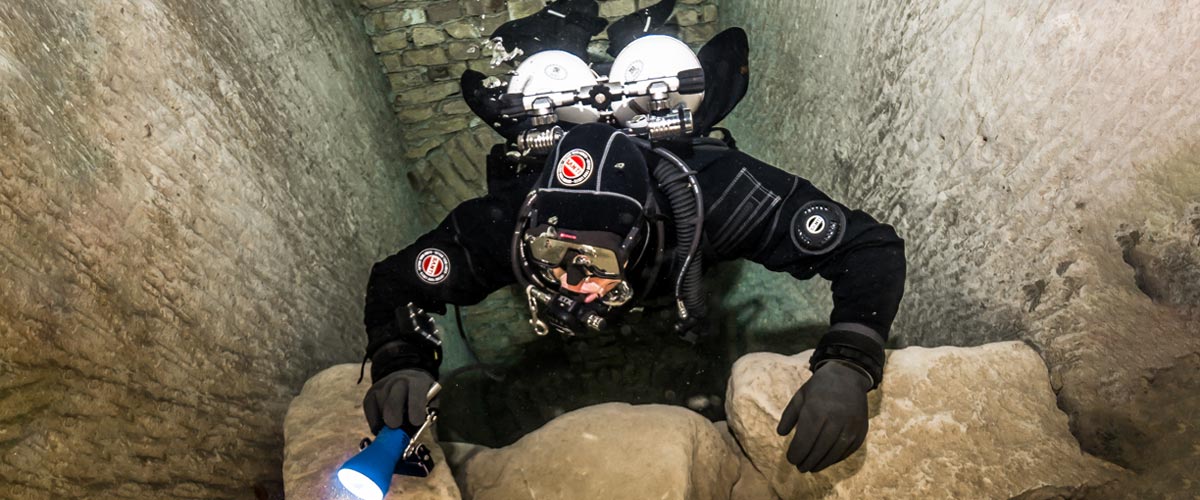
Article by José Pablo Mir
Pictures by Cezary Abramowski
The world of technical diving is exciting. It opens the door to new sites, depths, and bottom times. More importantly, it opens our minds to a new way of planning, facing, and experiencing dives, even those not purely technical.
Becoming a technical diver is a process, and like in other aspects of life, we should find the proper entry point that suits us best based on our knowledge and experience. The Introduction to Technical Diving course from TDI -the world’s largest and most recognized technical diving teaching organization- is the best option for divers who have yet to gain experience in the fundamental aspects of this new practice. The course’s content and its embrace of new techniques and technologies make it possible to acquire a solid foundation to learn and gain experience in this practice properly.
Becoming a technical diver is not something that happens overnight, whether deciding to become one or receiving a certification card stating we are now technical divers. It is a slow process extending farther away than any introductory course. It requires effort and dedication. But it will bring us satisfaction from day one -or two.
It is a matter of mentality
First, we must understand and accept that technical diving, involving greater depths, longer bottom times, exotic gases, virtual or real ceilings, and more, comes with higher levels of risk than the sport diving we have been practicing until now.
Although this discussion usually starts with a warning about risks, as I’ve done in the previous sentence, our practice is not a game of chance.
Technical diving is a rational activity that requires maturity and good judgment, and we will put everything into ensuring that each dive is a successful one -meaning we return from it safe and sound. With this understanding, we will strive to establish a mental attitude more aligned with our practice and its realities.
This new “technical diver” mindset we will develop will lead us to be more cautious in our executions, more analytical in our plans, more rational in our strategies, and more detailed in our procedures.
Experience will keep teaching us to know ourselves better, to keep our anxiety and other emotions under control, and to manage our impulses. Over time, our senses will sharpen, and we will be more attentive to the particulars of the situation we find ourselves in.
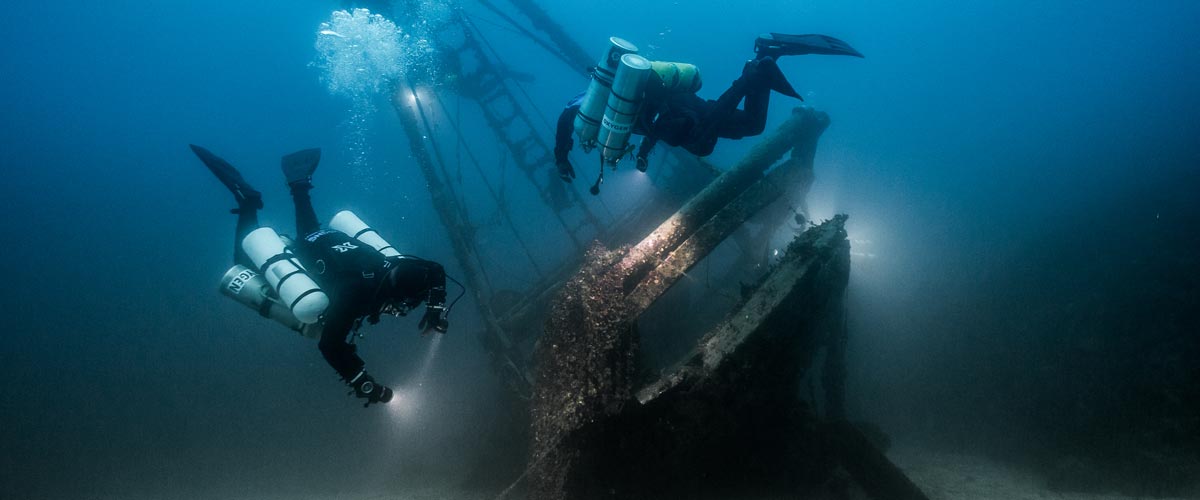
Strategies and procedures
Our strategies, those broad guiding lines tracing the path to follow, from how to approach planning to where, with what, and how we are willing to get there, will be more specific and more practical. Not because they magically become so, but because we will consciously and deliberately frame them that way.
We will establish clear, concise, and realistic procedures. Not only for the undesirable situations that may present themselves but also for those that are part of our dive objectives.
Even though, as technical divers, we often use equipment different from what we were previously accustomed to, it is essential to note that the gear does not make the diver. In a way, we could consider such equipment as the necessary tools to implement what our goal seeks to achieve, according to our strategies and procedures.
Technique plays an important role
We must put our greatest effort into learning and perfecting the different techniques we will be acquiring. Buoyancy, trim, propulsion, cylinder handling, deploying DSMBs and lift bags, valve drills, and more are essential skills we must begin to master to progress in our art. What we cannot do, when we need to do it, can harm us.
Our techniques must be effective and achieve the purpose for which they were devised. But they must also be efficient and require the least resources possible, including the time they take and the effort they demand. Effectiveness and efficiency will prevail over beauty and other considerations that may come to mind, although none of them should be mutually exclusive. A technique executed efficiently and effectively tends to have an inherent beauty.
Refining techniques is a lifelong mission. Some of them will be easy to master from the go; others, on the other hand, will be our life mission and will require many repetitions just to resemble the idea we have in mind of how they should be executed.
We must consider the environment
Our learning, the needs and musts of the practice we engage in, the experience we gradually gain, our strategies and procedures, and even our equipment and tools change with the environment.
Diving in the ocean, everything about us must be suitable for ocean dives. Conditions there rarely emulate those found in a pool, lake, or river. Variable winds and currents, greater depths, visibility conditions, other divers with uncertain skills around us, marine life, maritime traffic, distance from the coast, and many other factors add complexity and uncertainty.
It is never necessary to master the pool on the first day, but planning and aspiring to gradually cope with the ocean’s conditions is essential.
The cost of good training
We are aware that our resources are often scarce in relation to the possibilities of use we could give them if they were not. To a greater or lesser extent, we are part of the economic reality in which we are embedded.
Fortunately, the cost of good technical diver training is not an entry barrier. Comparing training and equipment costs, we see that the former are generally lower. Yes, lower cost for personalized service, essential to our future
performance and safety, than for a series of mass-produced products that are mere, albeit necessary, tools for an end.
The value of good training
The value of the training we received encompasses a range of characteristics, from emotional and methodological to technical and technological. TDI and its Introduction to Technical Diving course offer a deep and modern approach, with a teaching strategy that aims to create thinking divers, not merely obedient ones.
As technical divers, our knowledge is our primary tool. In this type of activity, what we don’t know can harm us.
Is this course optional?
Unfortunately, the fact that this Introduction to Technical Diving course is not a prerequisite for any subsequent training is an invitation to consider it optional. And we all know what usually happens to “optional” under budget constraints.
However, this course should be seen as optional only by those divers who are somehow familiar with the use of technical equipment, who have a mindset more in line with the requirements of this type of diving, who plan and execute the dives the proper “technical” way, who know their gas consumption rate, who are not intimidated by non-decompression tables, who feel comfortable using their dive computers, and know the techniques and have at least an acceptable level of buoyancy, positioning, and propulsion. Those can go straight to a more advanced training course, such as TDI’s Advanced Nitrox.
We must ask ourselves whether or not we are in that group.
Remember our goal: to have fun
Recreational diving is our passion. Jumping into the water carrying heavy equipment and having properly dotted our I’s and crossed our T’s have only one ultimate goal: fun. This is the activity we have chosen as a hobby. We must enjoy it; it must give us pleasure and make us vibrate.
Having a good time is not optional!
Blogs
Four opportunities to go pro in 2024 with Dive Friends Bonaire
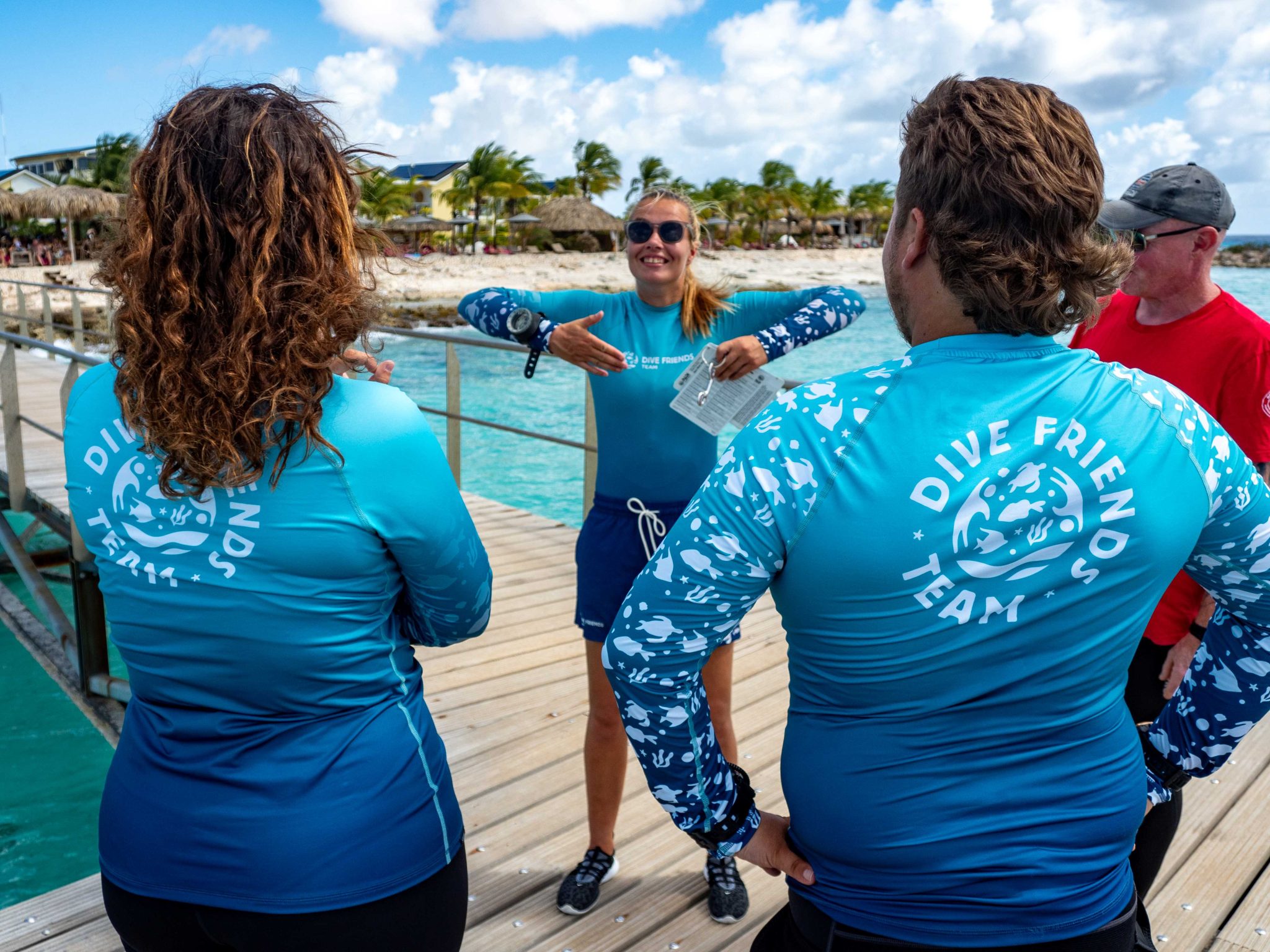
Dive Friends teaches the Instructor Development Course (IDC) several times a year to students who are eager to share their passion for diving with the world.
Dive Friends is known for the personal approach throughout the course. Their in-house course director will lead the students through every essential step, mentoring them to achieve their fullest potential as a dive instructor.
Applications for the following IDC start dates are now open:
- 12 April
- 5 July,
- 20 September
- 29 November
Partnership with Casita Palma
If the student opts for the IDC-Deluxe or IDC-Supreme package, their accommodation will be arranged for them at Casita Palma. This small and quiet resort is within walking distance from Dive Friends Bonaire’s main dive shop location and has everything you need to relax after an intense day of IDC training. Breakfast is included, so the student will always be fuelled and ready for their day.
Contact Dive Friends Bonaire’s Course Director Eddy for more information: coursedirector@divefriendsbonaire.com.
-

 News3 months ago
News3 months agoHone your underwater photography skills with Alphamarine Photography at Red Sea Diving Safari in March
-

 News3 months ago
News3 months agoCapturing Critters in Lembeh Underwater Photography Workshop 2024: Event Roundup
-

 Marine Life & Conservation Blogs3 months ago
Marine Life & Conservation Blogs3 months agoCreature Feature: Swell Sharks
-

 Blogs2 months ago
Blogs2 months agoMurex Resorts: Passport to Paradise!
-

 Blogs2 months ago
Blogs2 months agoDiver Discovering Whale Skeletons Beneath Ice Judged World’s Best Underwater Photograph
-

 Gear Reviews2 weeks ago
Gear Reviews2 weeks agoGEAR REVIEW – Revolutionising Diving Comfort: The Sharkskin T2 Chillproof Suit
-

 Gear Reviews3 months ago
Gear Reviews3 months agoGear Review: Oceanic+ Dive Housing for iPhone
-

 Marine Life & Conservation2 months ago
Marine Life & Conservation2 months agoSave the Manatee Club launches brand new webcams at Silver Springs State Park, Florida


